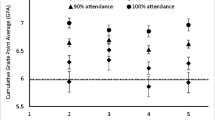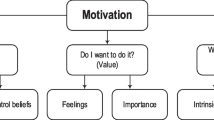Abstract
This paper contributes to knowledge about principled action which makes a difference to learners’ attainment. We report on the Improving Attainment in Mathematics Project,1 a project focusing on low-attaining secondary students. The purpose of the project was to introduce innovations in practice through action research with 10 teachers over 2 years, and evaluate the effect on students’ learning using national test scores, teachers’ reports, non-routine tasks and other performance indicators. However, this is not a study which shows how certain methods lead to better results. While it was found that learning improved, the methods and strategies the teachers used were not always generalisable across the project, indeed some were contradictory. Continued searching led to the identification of common underlying principles of teaching which different teachers manifested in different ways. Overt methods were less important than the collection of beliefs and commitments which underpinned teachers’ choices. There was, however, a convergence of practice around a focus on long-term development, the process of becoming a learner of mathematics, rather than short-term gains. In addition, we had to deal with some of the realities of authentic collaborative research with practitioners.
Similar content being viewed by others
References
Ahmed, A. (Low Attainers in Mathematics Project): 1987, Better Mathematics, HMSO, London.
Arsac, J., Balacheff, N. and Mante, M.: 1991, ‘The teachers’ role and the reproducibility of didactical situations’, Educational Studies in Mathematics 23, 5–29.
Boaler, J.: 1997, Experiencing School Mathematics: Teaching Styles, Sex and Setting, Open University Press, Buckingham.
Boaler, J., Wiliam, D. and Brown, M.: 2000, ‘Students’ experiences of ability grouping – disaffection, polarization and the construction of failure’, British Educational Research Journal 26, 631–649.
Boero, P., Dapueto, C. and Parenti, L.: 1996, ‘Didactics of mathematics and the professional knowledge of teachers’, in A. Bishop (ed.), International Handbook of Mathematics Education, Kluwer, Dordrecht, pp. 1097–1121.
Brown, M., Askew, M., Millett, A. and Rhodes, V.: 2003, ‘The key role of educational research in the development and evaluation of the national numeracy strategy’, British Educational Research Journal 29(5), 655–672.
Carroll, W. and Isaacs, A.: 2003, ‘Achievement of students using the University of Chicago School Mathematics Project’s Everyday Mathematics’, in S. Senk and D. Thompson (eds.), Standards-Based School Mathematics Curricula: What Are They? What do Students Learn?, Erlbaum, Mahwah, New Jersey, pp. 79–108.
Cooper, B. and Dunne, M.: 1998, ‘Social class, gender and equity and National Curriculum tests in mathematics’, in P. Gates (ed.), Proceedings of the First International Mathematics Education and Society Conference, University of Nottingham, UK, pp. 132–147.
DfE, Department for Education: 1995, Mathematics in the National Curriculum, HMSO, London.
DfEE, Department for Education and Employment: 2001, Key stage 3 National Strategy Framework for Teaching Mathematics: Years 7, 8 and 9, DfEE, London.
Ellerton, N. and Clarkson, P.: 1996, ‘Language factors in mathematics teaching’, in A. Bishop (ed.), International Handbook of Mathematics Education, Kluwer, Dordrecht, pp. 987–1033.
Even R. and Ball, D.: 2003, ‘Connecting research, practice and theory in the development and study of mathematics education’, Educational Studies in Mathematics 54, 139–146.
Griffiths, H. and Howson, G.: 1974, Mathematics: Society and Curricula, Cambridge University Press, Cambridge.
Hayes, W.: 1974, Statistics for the Social Sciences, Holt, Rhinehart and Winston, London.
Hiebert, J.: 1999, ‘Relationships between research and the NCTM standards’, Journal for Research in Mathematics Education 30, 3–19.
Hiebert, J., Carpenter, T., Fennema, E., Fuson, K., Wearne, D., Murray, H., Olivier, A. and Human, P.: 1997, Making Sense: Teaching and Learning Mathematics with Understanding, Heinemann, Portsmouth, New Hampshire.
Hiebert, J., Gallimore, R., Garnier, H., Givvin, K.B., Hollingsworth, H., Jacobs, J., Chiu, A.M.-Y., Wearne, D., Smith, M., Kersting, N., Manaster, A., Tseng, E., Etterbeek, W., Manaster, C., Gonzales, P. and Stigler, J.: 2003, Teaching Mathematics in Seven Countries: Results From the TIMSS 1999 Video Study, U.S. Department of Education National Center for Education Statistics, Washington, DC.
Ireson, J. and Hallam, S.: 2001, Ability Grouping in Education, Sage, London.
Kilpatrick, J.: 2003, ‘What works?’ in S. Senk and D. Thompson (eds.), Standards-Based School Mathematics Curricula: What Are They? What Do Students Learn?, Erlbaum, Mahwah, New Jersey, pp. 471–488.
Koehler, M. and Grouws, D.A.: 1992, ‘Mathematics teaching practices and their effects’, in D. Grouws (ed.), Handbook of Mathematics Teaching and Learning, Macmillan, New York, pp. 11–48.
Krutestkii, V.A.: 1976, (Trans. J. Teller), Kilpatrick, J. and Wirszup, I. (eds.), The Psychology of Mathematical Abilities in School Children, University of Chicago Press, Chicago.
Leder, G. (ed.): 1995, ‘Mathematics and Gender special issue’, Educational Studies in Mathematics, 28 (3).
Mokros, J.: 2003, ‘Learning to reason numerically: The impact of Investigations’, in S. Senk and D. Thompson (eds.), Standards-Based School Mathematics Curricula: What Are They? What Do Students Learn?, Erlbaum, Mahwah, New Jersey, pp. 109–132.
Niss, M.: 1999, ‘Aspects of the nature and state of research in mathematics education’, Educational Studies in Mathematics 40 (1), 1–24.
Ofsted (Office for Standards in Education): 2004, The Key Stage 3 Strategy: Evaluation of the Third Year, Her Majesty’s Inspectors, London.
Ollerton, M. and Watson, A.: 2001, Inclusive Mathematics 11–18, Continuum, London.
Pape, S., Bell, C. and Iffet, E.: 2003, ‘Developing mathematical thinking and self-regulated learning: A teaching experiment in a seventh-grade mathematics classroom’, Educational Studies in Mathematics 53(3), 179–202.
Pitt, A.: 2002, ‘Mathematical thinking?’ Mathematics Teaching 181, 3–5.
Polya, G.: 1962, Mathematical Discovery: On Understanding, Learning, and Teaching Problem Solving, Wiley, New York.
Ridgway, J., Zawojewski, J., Hoover, M. and Lambdin, D.: 2003, ‘Student attainment in the connected mathematics curriculum’, in S. Senk and D. Thompson (eds.), Standards-Based School Mathematics Curricula: What Are They? What Do Students Learn?, Erlbaum, Mahwah, New Jersey, pp. 193–224.
Romberg, T. and Shafer, M.: 2003, ‘Mathematics in Context MiC – Preliminary evidence about student outcomes’, in S. Senk and D. Thompson (eds.), Standards-Based School Mathematics Curricula: What Are They? What Do Students Learn?, Erlbaum, Mahwah, New Jersey, pp. 225–250.
Secada, W.: 1992., ‘Race, ethnicity, social class, language, and achievement in mathematics’, in D. Grouws (ed.), Handbook of Research on Mathematics Teaching and Learning, Macmillan, New York, pp. 623–660.
Senk, S. and Thompson, D. (eds.): 2003, Standards-Based School Mathematics Curricula: What Are They? What Do Students Learn?, Erlbaum, Mahwah, New Jersey.
Silver E. and Stein M.: 1996, ‘The QUASAR project: The, ‘revolution of the possible’ in mathematics instructional reform in middle schools’, Urban Education 30, 476–521.
Sztajn, P.: 2003, ‘Adapting reform ideas in different mathematics classrooms: beliefs beyond mathematics’, Journal of Mathematics Teacher Education 6(1), 53–75.
Thompson, A.: 1984, ‘The relationship of teachers’ conceptions of mathematics and mathematics teaching to instructional practice’, Educational Studies in Mathematics 15(2), 105–127.
Towers, J. and Davis, B.: 2002, ‘Structuring occasions’, Educational Studies in Mathematics 49(3), 313–340.
Trickett, L. and Sulke, F.: 1988, ‘Low attainers can do mathematics’, in D. Pimm (ed.), Mathematics, Teachers and Children, Hodder and Stoughton, London, pp. 109–117.
Watson, A. and Mason, J.: 1998, Questions and Prompts for Mathematical Thinking, Association of Teachers of Mathematics, Derby.
Watson, A.: 2001, ‘Low attainers exhibiting higher-order mathematical, ‘thinking’, Support for Learning 16(4), 179–183.
Watson, A., De Geest, E. and Prestage, S.: 2003, Deep Progress in Mathematics, University of Oxford Department of Educational Studies, Oxford.
Author information
Authors and Affiliations
Corresponding author
Rights and permissions
About this article
Cite this article
Watson, A., Geest, E.D. Principled Teaching for Deep Progress: Improving Mathematical Learning Beyond Methods and Materials. Educ Stud Math 58, 209–234 (2005). https://doi.org/10.1007/s10649-005-2756-x
Issue Date:
DOI: https://doi.org/10.1007/s10649-005-2756-x




